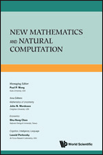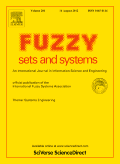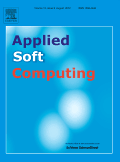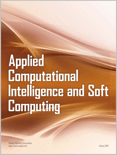
New Mathematics and Natural Computation
Scope & Guideline
Unlocking Insights in Applied Mathematics and Computational Theories
Introduction
Aims and Scopes
- Fuzzy Logic and Fuzzy Sets:
The journal extensively covers research on fuzzy logic and fuzzy set theory, exploring their applications in various domains such as decision-making, control systems, and data analysis. - Soft Computing Techniques:
There is a strong emphasis on soft computing methodologies, including soft sets, soft graphs, and soft topology, aimed at solving problems with uncertainty and imprecision. - Mathematical Modeling:
A core area of the journal involves the development of mathematical models to address real-world problems, including those in physics, biology, economics, and environmental science. - Computational Methods and Algorithms:
The journal promotes the use of advanced computational techniques, including neural networks, optimization algorithms, and numerical methods, to solve complex mathematical problems. - Applications in Natural Sciences:
Research that applies mathematical principles and computational methods to natural sciences, particularly in areas like epidemiology, environmental studies, and resource management, is a significant focus.
Trending and Emerging
- Quantum Computing and Fuzzy Logic:
Recent publications indicate a rising interest in the intersection of quantum computing and fuzzy logic, exploring how quantum principles can enhance fuzzy system applications. - Complex Systems and Dynamics:
There is an increasing focus on modeling complex dynamic systems, particularly in biological and ecological contexts, utilizing fuzzy and soft computational methods to analyze interactions. - Artificial Intelligence and Machine Learning Applications:
A significant trend is the application of fuzzy logic and soft computing in AI and machine learning, particularly in areas like natural language processing and decision-making algorithms. - Sustainable Development and Environmental Modeling:
Research addressing sustainability issues and environmental modeling using fuzzy and soft methods is gaining traction, reflecting a broader societal concern for ecological challenges. - Advanced Decision-Making Frameworks:
The development of sophisticated decision-making frameworks that incorporate fuzzy logic and soft sets is becoming a prominent theme, emphasizing their utility in uncertain environments.
Declining or Waning
- Classical Algebraic Structures:
Topics related to traditional algebraic structures, such as basic group theory or ring theory, are becoming less frequent, possibly overshadowed by more contemporary approaches like fuzzy and soft algebra. - Elementary Statistical Methods:
There is a noticeable decline in papers focusing on basic statistical methodologies, as the journal shifts towards more complex, application-driven statistical modeling techniques. - Single-Domain Applications:
Research that focuses solely on applications within a single discipline is waning, with a growing preference for interdisciplinary studies that integrate mathematics with various fields.
Similar Journals

FUZZY SETS AND SYSTEMS
Innovating Interdisciplinary Approaches in Fuzzy SystemsFuzzy Sets and Systems, published by Elsevier, is a leading international journal that delves into the intricate field of fuzzy logic and its applications in various domains, including artificial intelligence and computational mathematics. With a significant impact within its categories—ranking Q2 in Artificial Intelligence and Q1 in Logic for 2023—this journal offers a robust platform for scholars to share cutting-edge research and developments. Focusing on the application of fuzzy set theory to enhance decision-making processes, modeling, and data analysis, it caters to a diverse audience of researchers, industry professionals, and advanced students. The journal's rigorous review process and prestigious ranking, evidenced by its impressive Scopus metrics—2nd in Mathematics & Logic and 120th in Computer Science—underscore its importance in the academic landscape. Contributors are encouraged to explore innovative methodologies, theoretical advancements, and interdisciplinary approaches. Fuzzy Sets and Systems continues to serve as a vital resource for advancing knowledge and fostering collaboration within the fuzzy logic community.

Journal of Applied Mathematics & Informatics
Exploring the Intersection of Theory and Practice in Mathematics.Journal of Applied Mathematics & Informatics is a peer-reviewed academic journal published by the Korean Society of Computational & Applied Mathematics (KSCAM), focusing on the integration and application of mathematical theories and computational techniques across various domains. Established in 2019, this journal serves as a platform for researchers, professionals, and students to share innovative methodologies, practical applications, and theoretical advancements in fields like analysis, applied mathematics, and computational theory. As a Q4 ranked journal according to the 2023 category quartiles in analysis, applied mathematics, computational mathematics, and miscellaneous mathematics, it provides a valuable, albeit niche, contribution to the academic landscape. While the journal currently operates without open access options, it aims to disseminate quality research to foster collaboration and knowledge exchange within the mathematics and computer science communities. Researchers looking to explore emerging trends and methodologies in applied mathematics and informatics will find an essential resource in this journal, which is based in Daejeon, South Korea.

BOLETIN DE LA SOCIEDAD MATEMATICA MEXICANA
Connecting Scholars Through Mathematical InnovationBOLETIN DE LA SOCIEDAD MATEMATICA MEXICANA, published by Springer International Publishing AG, is a pivotal journal in the field of mathematics, particularly recognized for its contributions to the miscellaneous mathematics category, holding a commendable Q2 ranking as of 2023. With an ISSN of 1405-213X and an E-ISSN of 2296-4495, the journal serves as a platform for disseminating high-quality research and innovations from both national and international scholars. Operating from Switzerland, the journal encompasses a broad range of topics within mathematics, supporting the development and communication of mathematical knowledge. Although it is not open access, it remains a respected source for researchers, professionals, and students seeking to deepen their understanding of mathematical concepts and applications. Published continuously and rigorously since its converged years, BOLETIN DE LA SOCIEDAD MATEMATICA MEXICANA plays a crucial role in advancing mathematical discourse and collaboration across disciplines.

Fuzzy Information and Engineering
Innovating Solutions through Fuzzy Information and Applied MathematicsFuzzy Information and Engineering is a prestigious open access journal recognized for its contributions to the interdisciplinary fields of applied mathematics, control systems engineering, artificial intelligence, and information systems, published by TSINGHUA UNIVERSITY PRESS. With an impact factor that reflects its increasing influence, the journal has maintained a strong position in the academic community since its inception in 2011, converging its focus between 2014 and 2024. The journal is indexed in notable databases such as Scopus, demonstrating solid rankings across its categories, including a commendable Q3 classification in applied mathematics and control systems engineering. By fostering innovative research and disseminating key findings, Fuzzy Information and Engineering serves as a vital platform for researchers, professionals, and students alike, promoting advancements in fuzzy systems and their applications within diverse domains. Notably, since transitioning to an open access model in 2015, the journal has enhanced accessibility for a global audience, encouraging collaborative efforts in academia and industry.

APPLIED SOFT COMPUTING
Connecting ideas and applications in soft computing.Applied Soft Computing is a premier international journal published by Elsevier, dedicated to advancing the field of soft computing in various applications. With an ISSN of 1568-4946 and E-ISSN of 1872-9681, it has established itself as a leading resource with a commendable impact factor and significant importance in its field. As of 2023, it ranks in the Q1 category of Software in Scopus, boasting a rank of 25 out of 407 journals in Computer Science, Software, representing the 93rd percentile among peers. The journal's primary objective is to publish high-quality, innovative research articles that explore soft computing methodologies and their applications across diverse domains, fostering interdisciplinary collaboration and advancing technological solutions. Based in the Netherlands, at Radarweg 29, 1043 NX Amsterdam, it serves as a vital platform for researchers, professionals, and students eager to contribute to and stay informed about the latest developments in soft computing.

JOURNAL OF MULTIPLE-VALUED LOGIC AND SOFT COMPUTING
Fostering Collaboration in Logic and Computation.Journal of Multiple-Valued Logic and Soft Computing, published by Old City Publishing Inc, is a dedicated forum for advancing the fields of logic and soft computing. Since its inception in 2003, this journal has positioned itself as a valuable resource for researchers, professionals, and students interested in the complex interplay between multiple-valued logic systems and computational methodologies. With a broader reach into theoretical computer science, the journal is categorized in the Q4 quartiles across key areas, showcasing its role in disseminating relevant research despite its current position. This peer-reviewed publication silos essential discussions and breakthroughs that serve as a foundation for ongoing innovation in logic and computing theories. Though not currently open access, the journal continues to attract critical contributions that underscore its commitment to advancing knowledge in mathematical logic and software development through its effective symposium-like format, promoting collaboration among various stakeholders in the scientific community.

Computation
Transforming challenges into solutions through computation.Computation, published by MDPI, is an esteemed open-access journal that has been contributing to the fields of applied mathematics and computer science since its inception in 2013. With an E-ISSN of 2079-3197, this Swiss-based journal operates under a philosophy of free knowledge dissemination, allowing researchers, professionals, and students globally to access high-quality content without financial barriers. Recognized for its rigorous peer-review process, Computation is currently categorized in the Q2 and Q3 quartiles across significant domains, including Applied Mathematics (#181/635), Theoretical Computer Science (#52/130), and Modeling and Simulation (#138/324). As it converges towards 2024, the journal continues to attract innovative and impactful research aimed at advancing theoretical frameworks and practical applications within these disciplines. Joining the Computation community not only enriches individual research portfolios but also contributes to the broader conversation on computational methodologies and their applications in solving real-world problems.

Granular Computing
Transforming Insights into Actionable KnowledgeGranular Computing, published by SpringerNature, is a premier academic journal dedicated to the interdisciplinary field of granular computing, a vital area of research that intersects with Artificial Intelligence, Computer Science Applications, and Information Systems. With an impressive impact factor indicating its prominence, Granular Computing holds a distinguished Q1 ranking in all three categories as of 2023, making it a critical resource for researchers and practitioners seeking to advance their understanding and applications in these rapidly evolving domains. The journal, based in Switzerland, offers a platform for innovative research, thorough reviews, and discussions that push the boundaries of conventional computing paradigms. Aimed at fostering collaboration and knowledge exchange among academics and industry professionals, it continuously publishes cutting-edge findings and theoretical advancements from 2016 through 2024. Although it operates under a hybrid access model, the significance of its contributions is illuminative for anyone aiming to keep abreast of developments in granular computing and its applications.

Applied Computational Intelligence and Soft Computing
Advancing the Frontier of Intelligence and ComputingApplied Computational Intelligence and Soft Computing, published by HINDAWI LTD, is a premier open access journal that has been disseminating critical research since 2009, focusing on the intersection of artificial intelligence and soft computing. With an impressive array of quartile rankings in 2023, including Q2 in Civil and Structural Engineering and Computational Mechanics, this journal has established itself as a significant contributor to the fields of computer science and engineering. Based in Egypt, it plays a vital role in advancing knowledge by providing researchers, professionals, and students with easy access to high-quality studies. The journal’s rigorous peer-review process ensures that only the most impactful research is highlighted, making it an essential resource for those looking to stay abreast of the latest innovations and methodological advancements in applied computational intelligence. Its Scopus rankings further affirm its influence and reputation within the academic community, exemplifying its commitment to facilitating collaboration and fostering intellectual discourse in various scientific domains.

AIMS Mathematics
Elevating mathematical discourse with cutting-edge research.AIMS Mathematics, published by the American Institute of Mathematical Sciences (AIMS), is a premier open-access journal that has been providing a platform for innovative research since its inception in 2016. With a keen focus on diverse areas within the field of mathematics, this journal aims to disseminate high-quality studies that cater to both theoretical and applied aspects of mathematics. As evidenced by its impressive Scopus rank of 52 out of 399 in the category of General Mathematics, placing it in the 87th percentile, AIMS Mathematics stands as a significant contributor to the academic discourse in this discipline. The journal operates under Q2 in Mathematics (miscellaneous) for its 2023 category quartiles, reflecting its rigorous peer-reviewed process and substantial impact on current mathematical research. Accessible since its launch, the journal's open-access model ensures that researchers, professionals, and students alike can easily retrieve insights and advancements in mathematics, fostering collaboration and the advancement of knowledge globally.